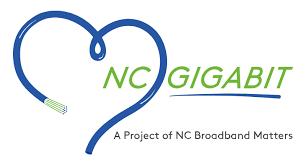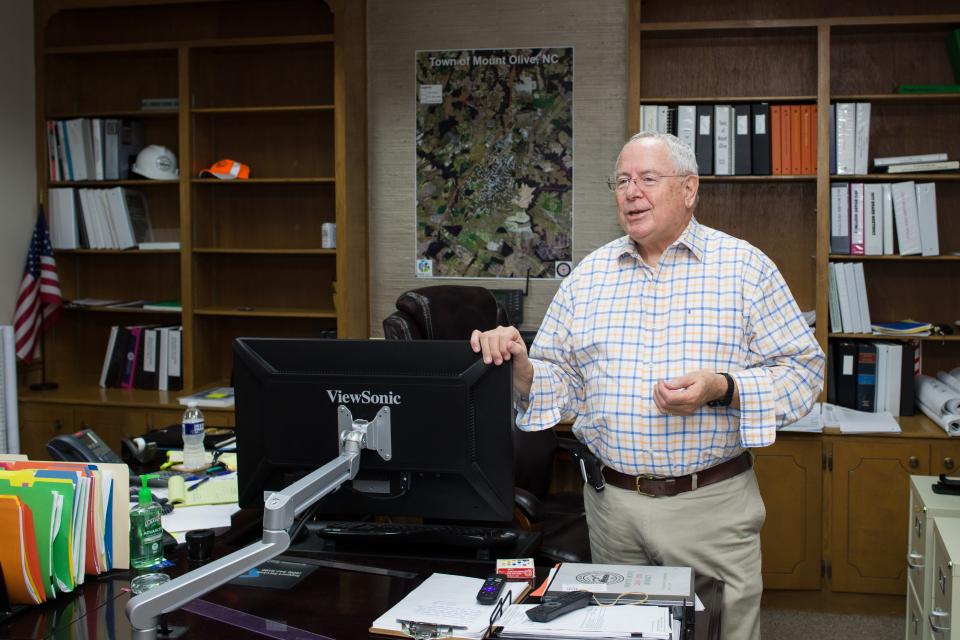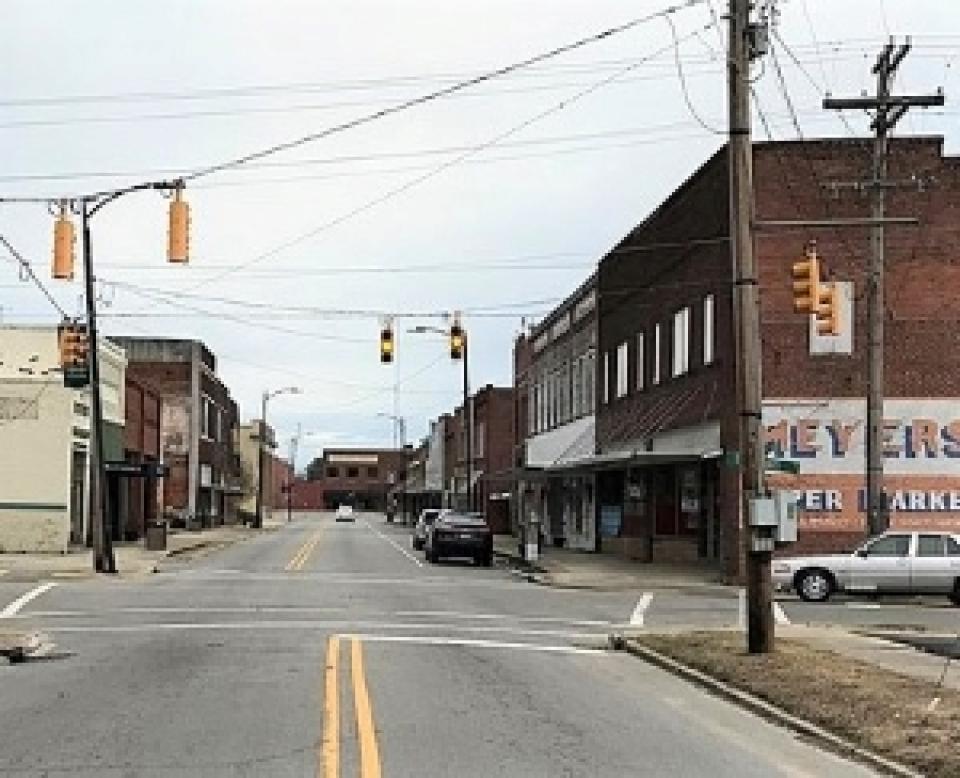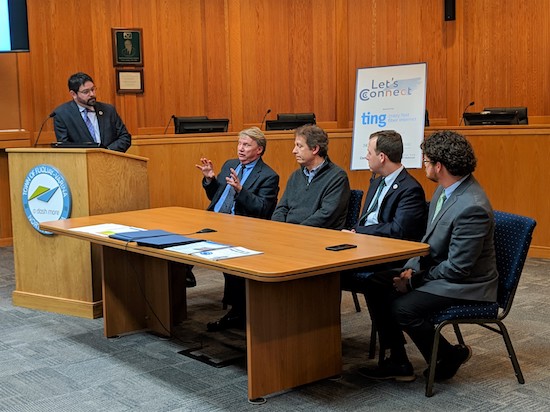
Fast, affordable Internet access for all.


For the twelfth episode of our bonus series, “Why NC Broadband Matters,” we’re joined by North Carolina League of Municipalities Chief Legislative Council Erin Wynia to talk about Internet access in the state a full year into the COVID 19 pandemic, and the access gaps experienced in towns across the eastern part of the state.
Erin shares with Chris how a collection of mayors banded together to write to the state’s attorney general, imploring him to look into Suddenlink’s business practices after fielding questions and complaints from residents and businesses about slow speeds, price hikes, and service interruptions.
The two also bring in the larger context of this discussion, including the frustrating politics of preemption in the state, the legal landscape faced by cities wanting to build their own information infrastructure (whether it’s to lease it to private providers via partnerships or operate a network themselves) and the serious consequences for residents and businesses who have no or poor wireline broadband access because of it.

We produced this episode and the “Why NC Broadband Matters” series in partnership with NC Broadband Matters, a nonprofit organization advocating for better connectivity across North Carolina.
This show is 32 minutes long and can be played on this page or via Apple Podcasts or the tool of your choice using this feed, at the Community Broadband Bits page, or at the NC Broadband Matters page. We encourage you to check out other "Why NC Broadband Matters" content at the podcast feed so you don't miss future bonus content that may not appear in the Community Broadband Bits Podcast feed.
Transcript below.
We want your feedback and suggestions for the show-please e-mail us or leave a comment below.
Listen to other episodes here or view all episodes in our index. See other podcasts from the Institute for Local Self-Reliance here.
Thanks to Shane Ivers for the Music: What's The Angle? by Shane Ivers - https://www.silvermansound.com a Creative Commons Attribution (4.0) license.
Paul Meyer, the Executive Director of the North Carolina League of Municipalities, has a new piece out outlining clearly and concisely what anyone living in or familiar with the state of broadband in North Carolina is thinking: the connectivity problems shown in such stark detail by the ongoing pandemic are nothing new, and the entities to blame are the huge out-of-state monopoly Internet Service Providers like Charter Spectrum and AT&T.
Both companies, and AT&T in particular, have spent hundreds of thousands of dollars over the last ten years to reduce competition across the state so that they can extract as much profit from North Carolina's communities as possible. Since the passage of HB 129 in 2011, no new municipal networks have been built in the state.
Meyer outlines the consequences of this reality, with residents and businesses alike stuck on old, slow, expensive connections that service providers have no incentive to upgrade in a broken marketplace.
Read the whole piece here, but see some excerpts below:
It has simply become unacceptable and unconscionable that a handful of companies stand in the way of allowing this to happen almost a decade after banding together to block municipalities from building and operating their own systems, and proclaiming as they did so that they would address the digital divide in the state.

The Covid-19 pandemic is affecting communities across the country in different ways. Recently, Christopher called up Scott Mooneyham, Director of Political Communications and Coordination for the North Carolina League of Municipalities, to find out how towns and cities in the Tar Heel State are faring.
Christopher and Scott discuss how the spread of the novel coronavirus has changed life in the state's communities and how local governments are responding to new needs while continuing to provide essential services. Scott shares stories from towns that are now struggling with broadband access, despite their proximity to major metros, creating public safety concerns.
The pair reflected on WRAL's recently released documentary "Disconnected," which compared connectivity in two North Carolina communities, Enfield and Wilson, and explored how the different levels of broadband access affected residents. They talk about how municipalities like Enfield would be able to partner with local companies to improve Internet access if the legislature removed the restrictive prohibitions currently in state law. Scott explains how the current Covid-19 shutdown has elevated the issues raised in the documentary while also piling many other priorities onto state legislators' desks.
This show is 22 minutes long and can be played on this page or via Apple Podcasts or the tool of your choice using this feed.
Transcript below.
We want your feedback and suggestions for the show-please e-mail us or leave a comment below.
Listen to other episodes here or view all episodes in our index. See other podcasts from the Institute for Local Self-Reliance here.
Thanks to Arne Huseby for the music. The song is Warm Duck Shuffle and is licensed under a Creative Commons Attribution (3.0) license.
We talked to residents of Mount Olive, North Carolina, about their struggle to get better Internet access and the importance of connectivity for their community. Listen to our conversations above, or read a summary below.
North Carolinians are fed up with slow, expensive, and unreliable Internet access. Communities across the state are seeking solutions, but are running into barriers, especially in rural areas.
The town of Mount Olive, home to about forty-six hundred people, is one such example. Only recently, after working with local Internet service provider Open Broadband, are they getting decent Internet access for residents and local businesses.
Charles Brown, Town Manager of Mount Olive, told us about the challenges the community faced before Open Broadband came to town. Getting high quality Internet access to a regional airport located just outside of town was a priority for local leaders — it generates around $21.1 million in local economic impact — but after going to every big Internet provider in the area and reaching out to their congressional representatives, they couldn’t make it happen.
It wasn’t until Brown and other town officials reached out to local Internet provider Open Broadband that they found a path forward.
OpenBroadband was able to install towers on the town’s water tanks and connect the airport. They also worked with the town to set up free public broadband access in downtown Mount Olive — something that’s especially popular during the North Carolina Pickle Festival, which draws more than 30,000 people to the area each year.

Brown said:
“While most of us take a high-speed Internet connection for granted, many living in rural areas feel disconnected,” states North Carolina television station WRAL’s new documentary, “Disconnected,” which first aired on March 19.
The documentary features local officials, healthcare professionals, small business owners, and families from across the state discussing the importance of high-quality broadband access and the struggle to connect rural areas. Though “Disconnected” was recorded before the Covid-19 outbreak forced schools and businesses to close nationally, the ongoing crisis further emphasizes the necessity of getting all North Carolinians connected to affordable, reliable Internet access.
“Disconnected” was created with help from the Institute for Local Self-Reliance, the North Carolina League of Municipalities, and Google Fiber. Watch the documentary below or on the WRAL website.
A Tale of Two Cities
To illustrate the importance of connectivity for everything from education to healthcare, “Disconnected” takes viewers to two small North Carolina towns — one with high-speed Internet access and one without.

In Enfield, home to 2,300 people, businesses and residents alike struggle to get connected, and town officials face difficulties attracting new employers to the area. Enfield Middle S.T.E.A.M. Academy reports that about 60 percent of students don’t have Internet access at home. WRAL interviews one student’s family, which only has unreliable satellite connectivity. “It’s a lot of running around,” says Lashawnda Silver, the student’s mother. “If I don’t provide it for her, she’s going to lose out.”
Whether you're a tech entrepreneur, manage a large industrial operation, or you specialize as an artisan who sells niche products online, fast, affordable, reliable connectivity is now a critical utility for your business. A recent SpotLight article from the North Carolina League of Municipalities (NCLM) and hosted by WRAL.com, shines a light on the impact of reliable broadband on rural businesses, residents, and local economies.
Unrealized Potential
NCLM provides multiple examples supporting the theory that lack of high-quality connectivity and access to digital tools results in unrealized potential — in jobs, home-based businesses, and small business revenue. A 2019 study from the U.S. Chamber of Commerce suggests that 66 percent of rural small businesses struggle with poor Internet or mobile phone connectivity.
Sheila Pope and her husband — both attorneys — have no Internet access at home and when their daughter returns home from college, she must make the trek into town to scope out a reliable connection.
"The trend is for more and more online work. She [Pope's daughter] would have to come to our office or go to the coffee shop in town. We got unlimited data through our cell phone provider so that we could use our phones as a hotspot, but that's unreliable and sometimes the connection would go out and she would lose all her work. It's very problematic," Pope said. "People are not going to want to come here to live and businesses aren't going to come here when they can't get what they need to do business in this digital age."
NCLM spoke with Aaron Carter, director of marketing for Rhino Shelf, a storage shelving manufacturer. Only recently has the company been able to subscribe to Internet access faster than 20 Mbps:
Two pieces of recently introduced legislation in North Carolina’s General Assembly show a potential to help grow broadband in rural areas. In the past, state lawmakers have kept publicly owned Internet networks tightly reined in to protect cable and telephone monopolies operating in the state, but the restrictions may be loosening as state leaders recognize the need for more options.
The FIBER NC Act
The long list and leadership positions of sponsors attached to H 431 indicate that the FIBER NC Act shows promise. It’s four primary sponsors include the Rules Committee Chair and a Finance Committee Chair, which also bodes well for the future of H 431. Our friends at the North Carolina League of Municipalities (NCLM) tell us that they expect a similar companion bill with equal muscle behind it to come from the Senate.
The FIBER Act would change existing barriers to allow municipalities and local government the authority to invest in publicly owned broadband infrastructure in order to work with private sector partners. The bill also includes procedures that local governments must follow if they decide to pursue a public-private partnership, including conducting a feasibility study, and proper notification and execution of meetings. Within the language of H 431, the authors include specific instructions for publication and advertisement that describe the opportunity to lease the infrastructure.
Bipartisan support of the bill and the fact that almost 50 House Members, in addition to the four sponsors, have signed on add to the optimism that H 431 has a bright future. Folks at NCLM have expressed strong support for the bill and are galvanizing constituents to encourage elected officials to move H 431 forward.
It’s first stop is the Committee on Energy and Public Utilities. If it passes there, H 431 will move on to Finance and then to the Rules Committee.
Read the full language of H 431 and follow it’s progress.
Untying Cooperative Hands
Last week, community leaders, local ISPs, residents, and policy experts gathered in three North Carolina communities — Albemarle, Fuquay-Varina, and Jacksonville — for a conversation about improving local connectivity. The Institute for Local Self-Reliance (ILSR), the North Carolina League of Municipalities (NCLM), and NC Hearts Gigabit organized this series of broadband meetings, called Let’s Connect, which aimed to spark conversations about the need for better broadband access and potential solutions for the region.
Each meeting opened with a welcome from local municipal leaders, followed by a presentation from Chris Mitchell, Director of ILSR’s Community Broadband Networks initiative, and a panel discussion between local leaders and innovative ISPs. Panelists talked about the need for better broadband to support everything from economic development to agriculture to health care, and why it’s necessary to bring all voices to the table in order to solve this issue. Mitchell noted:
“We electrified the country with private investment, municipal investment, and cooperative investment. That's what we'll need to bring Internet access to everyone."

One of the biggest takeaways was the need for the North Carolina state government to more explicitly authorize public-private partnerships, which would allow municipalities to invest in broadband infrastructure and then lease it to private companies that provide service.
Our Christopher Mitchell and Katie Kienbaum are participating in Let’s Connect! speaking tours at several communities in North Carolina. The events, organized with NC Broadband Matters, NC Hearts Gigabit, and the North Carolina League of Municipalities, has been a chance for local residents in Albemarle, Fuquay-Varina, and Jacksonville to gather together and discuss rural broadband. While each community’s needs are unique, there are some common themes and the conversation can be valuable to anyone interested in learning more about ways to improve connectivity in their community.
Can't Make It? No Prob
In order to reach folks in different regions, organizers set up the events in towns across the state and schedule the meetings during evening hours. Nevertheless, there may be people who would like to attend, but aren’t able to due to work, transportation challenges, or other issues.
In order to make at least one event accessible to as many people as possible, folks in Jacksonville have set up a livestream, which will be presented via Jacksonville - Onslow Government Television. The event is scheduled for 6 p.m. local time on January 30th.
View the event here January 30th at 6 p.m. EST
This Line-Up
In addition to Christopher, confirmed speakers include:
If you’d like to attend the free event, you don’t need to RSVP, but seating is available on a first come, first served basis. The Jacksonville event will be held at the Jacksonville Youth Council Youth Center at 804 Bridge St. in Jacksonville.
People in the North Carolina towns of Albemarle, Fuquay-Varina, and Jacksonville, are gathering together this week to discuss rural broadband. Our own Christopher Mitchell and Katie Kienbaum are meeting with residents along with representatives from the North Carolina League of Municipalities and NC Hearts Gigabit in the three towns across the state. Recently, in WRAL TechWire, reporter Chantal Allam shared an interview with Will Aycock, who heads up Wilson’s publicly owned broadband network.
 Aycock described how Wilson’s Greenight Community Broadband had been developed to support the economic vitality of the community, while also providing other benefits. He also stressed that Wilson’s decision was significant for them and that each community needs to decide what’s best for their own needs.
Aycock described how Wilson’s Greenight Community Broadband had been developed to support the economic vitality of the community, while also providing other benefits. He also stressed that Wilson’s decision was significant for them and that each community needs to decide what’s best for their own needs.
In Wilson, he adds, the network has helped to spur a long list of economic development investments, including downtown revitalization and investment in the community’s corporate park. New jobs continue to spring up, while other nearby rural areas contend with losses. The local college has taken advantage of new technological training and programs that require gigabit connectivity. Additionally, the city’s other utility systems benefit from the advanced connectivity. “None of these accomplishments are because of Greenlight specifically, but rather Greenlight is part of a team both within the City and across the broader community that all work together to build our future,” says Aycock.
He and Allam also talk about plans that Wilson and Greenlight have to use the broadband network and fiber infrastructure to continue to advance. Smart city applications, innovative options for entrepreneurs, and more collaboration are all in the future for Wilson. Aycock described Wilson's future vision: